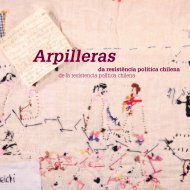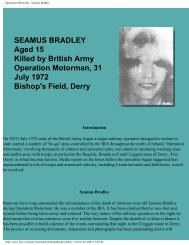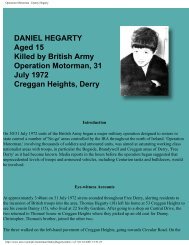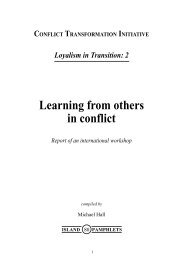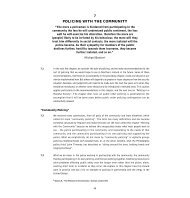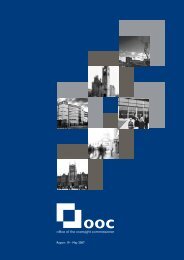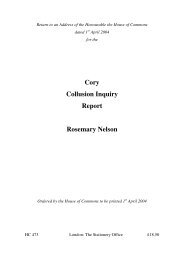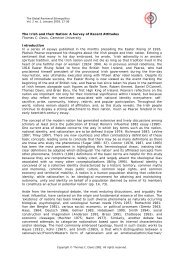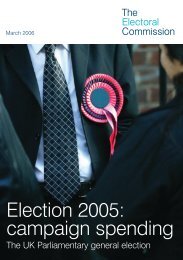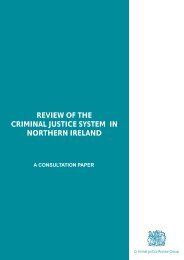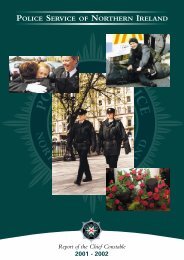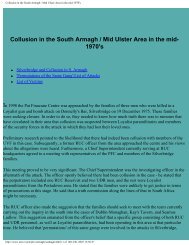(14) Reinforcing Powerlessness - CAIN - University of Ulster
(14) Reinforcing Powerlessness - CAIN - University of Ulster
(14) Reinforcing Powerlessness - CAIN - University of Ulster
Create successful ePaper yourself
Turn your PDF publications into a flip-book with our unique Google optimized e-Paper software.
Published January 1996 by Island Publications132 Serpentine Road, Newtownabbey, Co Antrim BT36 7JQ© Michael HallISBN 1 899510 05 2Printed by Regency Press, Belfast2
IntroductionOn 27 November 1995, after weeks <strong>of</strong> almost daily warnings from Sinn Féin sources thatthe Northern Ireland ‘peace process’ was in ‘crisis’, this item appeared on Teletext:Mayhew Praises People PowerPeople power would prevent a return <strong>of</strong> IRA violence, the Northern IrelandSecretary Sir Patrick Mayhew said. Responding to Sinn Féin leader Gerry Adams’claim that conflict was inevitable without talks, he said the “passionatedetermination” <strong>of</strong> [ordinary] people would keep the ceasefires intact.Sir Patrick was, in my opinion, quite correct to assume that the vast majority <strong>of</strong> peoplehere fervently desire peace, and equally justified in surmising from this that a return toviolence hardly seems possible with so many opposed to it. However, the reality is thatthe very people with the greatest desire to see genuine peace emerge – the ordinarycitizens <strong>of</strong> Northern Ireland – are the ones least empowered to see this process through toa satisfactory conclusion. Instead, power over our future remains firmly in the hands <strong>of</strong>all those, whether government ministers, faceless bureaucrats, local politicians, or thevast army <strong>of</strong> assorted pr<strong>of</strong>essionals and middlemen – and not forgetting the paramilitaries– who have so manifestly failed us in the past.It is not that ordinary people have made no effort to contribute positively to thissociety’s welfare – quite the opposite. Throughout the past twenty-five years <strong>of</strong> violencecountless individuals and grassroots groups, in a multitude <strong>of</strong> ways, have striven to effectpositive social change within their own localities and to create conditions for dialoguebetween our divided communities. These efforts, <strong>of</strong>ten involving much time, energy andpersonal risk, have largely gone unrecorded and unacknowledged, yet cumulatively mustsurely make up the real ‘hidden history’ <strong>of</strong> <strong>Ulster</strong>’s tragedy.Throughout our turmoil these individuals and groups have constantly pitted theirenergies against manipulative bureaucrats, struggled frustratingly for never-appearingresources, stood up bravely to uncaring paramilitaries, and constantly striven to overcomethe doubts and apathy <strong>of</strong> friends and neighbours. Sometimes their efforts met withlimited success, but more <strong>of</strong>ten than not they were ignored, frustrated, sidelined – <strong>of</strong>tenquite deliberately – by those with control over resources and decision-making.For some years now I have been trying to encourage various community activists torecord their experiences, but with little success. Some are too busy confronting presentneeds, some still doubt the importance <strong>of</strong> their efforts, some are disillusioned, otherssimply worn out. Yet our society is at such an important crossroads – where ordinarypeople must finally decide where they want to go – that I feel compelled to make a startat describing how powerlessness is reinforced at the grassroots, even if I have had tomake use <strong>of</strong> many <strong>of</strong> my own experiences – something I feel very uncomfortable about.Nevertheless, I believe that the recounting <strong>of</strong> actual experiences is far more effective inshedding light upon the various processes at work than any amount <strong>of</strong> theory.3
one resident put the following proposal to me:Would you tell the social worker that we are willing to help in any way we can.He doesn’t need to tell us anything about the family, but we would like him to callinto the community centre and introduce himself. Even if he feels there is nothingwe can do, at least we’ll know who to contact if problems arise, and it will help usprevent another angry crowd gathering in the street.At the subsequent case conference, although the police investigation had revealednothing to substantiate the allegations, the situation was felt to need monitoring and aSocial Services social worker was assigned to the case. When asked whether I wanted toadd anything to the proceedings I said I wished to present the ‘community perspective’,noting a few bemused glances being exchanged as I did so. I duly passed on to the socialworker the request made by the neighbours.On a visit to the community centre a few weeks later one <strong>of</strong> the residents remindedme <strong>of</strong> this request, saying: “That social worker has driven in and out <strong>of</strong> the estate acouple <strong>of</strong> times, but has never come near us.” When I contacted the social worker, heasked me to apologise to the residents and explain that he had been extremely busy. Afew weeks later I was asked the same question; I again contacted the social worker andreceived the same apology. This time, however, when I was relaying this to the residents,one <strong>of</strong> them halted me in mid-sentence: “Don’t waste your time – they’re not effin’interested! People like us are <strong>of</strong> no importance to them!”This time when I phoned Social Services I pursued the matter more determinedly,until the truth came out. It was exactly as those in the community had suspected: “Whyshould our worker have to go near them – what business is it <strong>of</strong> theirs?” It was quiteobvious that the community were considered to be the people who suffered socialproblems, not the people who solved them – that was solely the job <strong>of</strong> pr<strong>of</strong>essionals.‘Social’ problems? What social problems?I <strong>of</strong>ten felt that the label social worker was a misnomer. A more accurate description iscase worker, for although social workers accepted that each client suffered from ‘social’problems, they invariably treated these clients as strictly individual cases, with littleeffort made to find a social answer to their problems. Often, social workers made visitsfrom their <strong>of</strong>fices to peoples’ homes the way the U.S. Cavalry must have made sortiesout <strong>of</strong> Fort Laramie – conscious that their journey was taking them through Indianterritory, but hoping that contact could somehow be avoided. This might seem somewhatexaggerated, but it was my experience that social work management in particular wasmostly blind to the strengths and capabilities already existent within working-classcommunities – it seemingly required pr<strong>of</strong>essionals to import the required expertise fromoutside – even when the development <strong>of</strong> such community strengths might help toalleviate the burden faced by hard-pressed social workers.One <strong>of</strong> my cases was a young woman with five children – her husband being inprison. Whenever things got on top <strong>of</strong> her, she simply abandoned her abode and eithersquatted in an empty house or dumped herself upon relatives until she was rehoused.Indeed, she had been rehoused so <strong>of</strong>ten by the Housing Executive they understandablyrefused to consider her any more, and on subsequent occasions <strong>of</strong> homelessness she and5
her children had to be accommodated, at Social Services expense, in hotels. When eventhis broke down, the Executive finally relented – for the last time, they insisted – and thefamily were again rehoused. However, everyone knew that it was only a matter <strong>of</strong> timebefore the cycle was repeated, and apart from taking the children into care, which we didnot really want to do, no-one knew how to break it, least <strong>of</strong> all myself.But people in the community knew. She was invited to join a fledgling women’sdrama group, and, after some persuasion, hesitantly agreed. Within a very short time aremarkable transformation had occurred. She gained considerably in self-esteem, and –because the group held their meetings in one another’s houses – began to keep her homeclean and tidy, rather than let a mess pile up from which previously she would have runaway. The children gained too, for they realised that this time they might be staying putand so made a proper effort to find friends. Within a short time I was able to close thecase – the success owing nothing to social work!An undervalued resourceWhen I joined NSPCC it was undergoing a period <strong>of</strong> self-examination. Its centenary wasapproaching and it was attempting to redefine itself, especially in relation to its bigbrother, the Social Services. In such periods <strong>of</strong> questioning all options can seem equallyviable, and I was permitted to develop my own ‘community-orientated approach tosocial work’. I built up close links with numerous community groups in Belfast andNewtownabbey, operating an informal surgery for some <strong>of</strong> them at selected times eachweek. These groups benefited from being able to provide an on-site social worker as part<strong>of</strong> their community outreach, and the close working relationships I developed with some<strong>of</strong> the groups helped to dispel much <strong>of</strong> the antagonism with which social workers hadinvariably been viewed. On visits to the groups – if I wasn’t occupied with clients – Iwould <strong>of</strong>ten sit down with the community volunteers and explore how they themselvescould best tackle the numerous problems they encountered.I soon discovered ample evidence for what I had long believed – that each communitypossessed an untapped mine <strong>of</strong> strengths and abilities. Time and again I encounteredindividuals – from young people to senior citizens – whose commitment, energy,understanding, and ability to empathise <strong>of</strong>ten exceeded that possessed by many trainedsocial workers. All that these community volunteers required was a little guidance andsupport – yet all they too <strong>of</strong>ten received was avoidance and pr<strong>of</strong>essional alo<strong>of</strong>ness.In one estate a number <strong>of</strong> young women – all single-parents – had formed a group formutual support, and one day informed me that, because I had helped some <strong>of</strong> them withtheir problems, they in turn wanted to help some <strong>of</strong> the families I visited. I explained thatfor reasons <strong>of</strong> confidentiality the families on my caseload might not accept their assistance.However, I asked them, surely they already knew families with similar problems – whatwas to stop them <strong>of</strong>fering assistance to those families?We then explored just what was stopping them, and it was obvious they were wary <strong>of</strong>“what we might find”, and anxious that they might not know how to handle it. Whatwould they do, for example, if someone admitted to harbouring fears <strong>of</strong> injuring theirchild, or displayed deep-seated emotions? At least by getting involved in my cases, theycould safely leave such problems to me. More earnest discussion followed, at the end <strong>of</strong>6
which the group and I worked out the following agreement. They would identify suitablefamilies and <strong>of</strong>fer assistance, and if accepted, would engage those families on theunderstanding that should they need advice I could be contacted at any time. Should realproblems surface, they would suggest to the family that I become involved directly. Itwas also understood that if there was any suspicion <strong>of</strong> child abuse I would have toinvestigate, whether the family agreed or not.In the event, these young women rarely needed to contact me, and in subsequentprogress meetings I was surprised not only by the range <strong>of</strong> problems they had begun totackle, but by the natural abilities they had been able to utilise. And all it had taken wasthe assurance that pr<strong>of</strong>essional help was at hand should problems arise – this had beenthe catalyst which permitted these natural abilities to surface.Not to everyone’s liking . . .As I repeated this approach with other groups, it was made known to me that otherpr<strong>of</strong>essionals (though not from within my own agency) were observing me withdisapproval. I was informed I was ‘taking a risk’ entrusting serious matters to ‘nonpr<strong>of</strong>essionals’;I was demeaning my years <strong>of</strong> university training by imagining socialwork skills could be imparted to community volunteers in half-hour ‘chat’ sessions; Iwas consorting with well-known community activists whose strident pronouncementsagainst the prevailing social and economic conditions could cause my employersembarrassment; my presence was adding credibility to groups who might have overtpolitical agendas; I was allowing community groups to dictate my workload. . .It did not seem to matter that the community volunteers were well aware just whatconstituted a ‘serious’ matter, and were actually more willing than they had previouslybeen to request pr<strong>of</strong>essional assistance, because it now seemed less threatening and moresupportive. It did not seem to matter that groups who genuinely cared about people’ssocial needs were inevitably developing a realistic appreciation <strong>of</strong> political and economicrealities, and were not in any mood to stick their heads in the sand, a habit perfected by somany pr<strong>of</strong>essionals. Or that these community groups actually helped me devote moreattention to the work I was trained for, because while the groups referred difficult casesto me, they in turn accepted from me all those tasks which had previously taken up aninordinate amount <strong>of</strong> my time – benefit, housing, debt and other such matters. No, whatreally seemed to be at the root <strong>of</strong> all this pr<strong>of</strong>essional antagonism was that there was adanger <strong>of</strong> revealing that the emperor had no clothes, that social work skills were notsomething magical known only to the initiated, but were a combination <strong>of</strong> common sensereasoning and natural ability given direction by proper training. One pr<strong>of</strong>essionalcomplained to me: “These young people could end up imagining they could do our jobbetter than us.” What a shock that would be!“They would need to be under our control. . .”Despite the efforts to present this antagonism to my community involvement as a‘pr<strong>of</strong>essional’ critique, it was difficult not to conclude that what was really at issue wasthe power relationship between pr<strong>of</strong>essionals and non-pr<strong>of</strong>essionals, and the desire,evident in most pr<strong>of</strong>essions, not to lose control over a jealously-guarded monopoly.7
Before I joined NSPCC that organisation used to employ ‘women visitors’, who tookon many <strong>of</strong> the time-consuming support tasks which invariably arose during work withfamilies, thereby releasing the NSPCC Inspector for more skilled work. Time and againduring staff meetings my older colleagues would lament the demise <strong>of</strong> this service, andnewer recruits like myself could readily sympathise with them, for our caseloads at thattime numbered between 30 and 40 families, and an inordinate amount <strong>of</strong> our time wastied up with routine support tasks.After having spent six years building up good working relationships with numerouscommunity groups, some <strong>of</strong> those groups were now expressing a desire to expand thatlink to the further benefit <strong>of</strong> the community. Few groups, however, were in a position to<strong>of</strong>fer much by way <strong>of</strong> practical support, except for Farset Youth and Community Project,situated along the West Belfast interface, and one <strong>of</strong> the largest providers <strong>of</strong> ACE jobs inBelfast. Farset’s manager, Jackie Hewitt, had pondered hard about my workloadpredicament, and finally put the following proposal to me:Farset will employ between 10 and 20 ACE workers on tasks similar to thoseundertaken by the ‘women visitors’ you told me about. They can help childrenwith their homework; accompany mothers on shopping trips; sit and chat withpeople who are feeling lonely or depressed; baby-sit to give hard-pressed mothersa break; do a bit <strong>of</strong> housework or gardening if it helps brighten up someone’shome; try to develop a support-network for families . . . You identify what theneeds are, and we’ll meet them. To keep them fully occupied, these workers willobviously have to respond to other requests from the community, but theirprimary role will be to respond to NSPCC needs.I was delighted, not only because I could envisage the sigh <strong>of</strong> relief on the part <strong>of</strong> mycolleagues, but because here was tangible evidence that a community-orientated approachto social work could result in highly productive relationships being developed with thoseworking at the grassroots. I was soon to be brought back to pr<strong>of</strong>essional reality.Management informed me that while the scheme had great merit, it was not possible toproceed with it, for a very simple reason: “Those workers would really need to be underour control, not under the control <strong>of</strong> a community group.”I felt deeply disappointed; the NSPCC was doing excellent work in the community,but like other agencies, it did not seem able – certainly at that time – to countenancepractical arrangements whereby its relationship with the community could be based upona genuine and not a pretend partnership. (Shortly afterwards, when management instructedme to relinquish my community outreach altogether, I resigned.)I remain convinced that the very people who are experiencing social problems areultimately the best ones to tackle them, and the sooner pr<strong>of</strong>essionals discard their ‘themand us’ mentality and begin to work on a basis <strong>of</strong> genuine equality with the community,the more realistic are our chances <strong>of</strong> overcoming our social, economic – and ultimatelyour political – problems. I believe it can be done, and there is a growing awareness <strong>of</strong> theneed for such an approach. [Indeed, in the last few years the NSPCC – which always hada strong foothold in our communities through its extensive network <strong>of</strong> playgroups – hasinitiated, to complement its Child Protection Service, a number <strong>of</strong> community-basedprojects which actively encourage user-group participation.]8
2: “Politics is better left to people like us”“They should be horsewhipped out <strong>of</strong> the area!”I have mentioned the fear many pr<strong>of</strong>essionals have that community groups are too proneto become involved in political issues. This is a fear shared by many within theestablishment. Government spokesmen, politicians, church leaders and assortedpr<strong>of</strong>essionals, who frequently lamented the inability <strong>of</strong> working-class people to cometogether and cease killing one another, became decidedly less enthusiastic when ordinarypeople did come together but turned the spotlight upon the social, economic and politicalinequalities for which those in the establishment were ultimately responsible.When the radical young members <strong>of</strong> the Rathcoole Self-Help Group in 1985 accusedUnionist politicians <strong>of</strong> having little real concern for the welfare <strong>of</strong> the people in this largeProtestant working-class estate, local Unionist politicians were outraged. Up until thenRathcoole had always provided a compliant electorate – easily lulled into acquiescencewith slogans like ‘This we will Maintain’ and ‘No Surrender!’ Yet here were these youngloudmouths kicking up a stink on social issues! One local councillor expressed thisoutrage in no uncertain terms; labelling the group as “subversives” he asserted: “I thinkthere is only one answer. That is to get a big horse-whip and whip them out <strong>of</strong> theborough once and for all.”When a community education project was initiated at Conway Mill on the LowerFalls, it was made clear by the organisers that any issue relevant to the lives <strong>of</strong> ordinarypeople could be discussed there, and anyone could be party to, or even initiate, thosediscussions. Protestants would have been more than welcome to take up this challenge,although the sectarian geography <strong>of</strong> Belfast militated against such an opportunity beingproperly utilised. Many <strong>of</strong> the debates and seminars which did take place understandablyfocused on social and political issues pertinent to the people <strong>of</strong> the Lower Falls, and,naturally enough, were attended by many shades <strong>of</strong> community and political opinionwithin the Nationalist community – including the Republican movement.However, just as their counterparts in Rathcoole discovered, this was not the type <strong>of</strong>debate those in the establishment had in mind in their appeals to the community. Thiswas not ‘peace and reconciliation’ – this was agitation and subversion. Some <strong>of</strong> thesevenues soon found themselves stigmatised in an attempt to silence them, ‘politicalvetting’ being part <strong>of</strong> this. Political vetting had its origin in a Parliamentary statement on27 June 1985 by the Secretary <strong>of</strong> State for Northern Ireland, Douglas Hurd:I am satisfied that there are cases in which some community groups or personsprominent in the direction or management <strong>of</strong> some community groups, havesufficiently close links with paramilitary organisations to give rise to a grave riskthat to give support to these groups would have the effect <strong>of</strong> improving thestanding and furthering the aims <strong>of</strong> a paramilitary organisation, whether directlyor indirectly.9
Although no specific charges were ever made, several community organisations onboth sides <strong>of</strong> the divide – including Conway Mill Education Project on the Catholic sideand Glencairn Community Centre on the Protestant side – had their funding withdrawn.While political vetting did not prevent constructive work continuing at such venues –despite greatly curtailed resources – it militated against them being able to extend anydebate in an effective cross-community manner. Indeed, the insinuation that thesecentres were fronts for paramilitary organisations – notwithstanding the fact that suchallegations were never substantiated – made them suspect to the other community, evento the extent that death threats were received.Not only have community groups been effectively silenced in this way, but wholecommunities have been stigmatised, with the people <strong>of</strong> West Belfast in particular –whether in the Shankill or the Falls – made to feel increasingly criminalised andmarginalised. This distancing process not only allowed those in the establishment toavoid having to respond to the real needs <strong>of</strong> these communities, but hampered ordinarypeople from initiating purposeful debate on the root causes <strong>of</strong> the problems facing them,the communal divide included. Then again, perhaps that was always the intention.‘Bred’ into politicsFew have been more eager to prevent the voice <strong>of</strong> the people being heard than ourpoliticians. Certainly they want that voice to be strident when raised at their behest orwhenever the big drum is beaten, but not when it is raised independently. Whatevermight seem to divide local politicians, they appear united in their concern to ensure thatpolitical power does not seep outside their own control. At a public debate in 1994, awell-known Unionist politician, stung by criticism from the floor, proclaimed: “It’s notfor you people to be spouting politics.” Then, indicating his supposed SDLP adversarywith whom he was sharing the platform, he continued: “Politics is better left to peoplelike us.” And recently a prominent member <strong>of</strong> the Orange Order unashamedly expressedthe ludicrous opinion that “some people are bred to lead”.Power always acts to reinforce itselfWhen Unionist politicians condemned the British and Irish governments for ignoringthem in the discussions which led to the Anglo-Irish Agreement, and more recently theFramework Proposals, they were only experiencing a removal from decision-makingprocesses which ordinary people experience daily.The process is at times quite transparent. One example (out <strong>of</strong> many I could give)occurred some years ago when a group <strong>of</strong> people from the Shankill Road, trying todefuse a potentially dangerous situation developing with regard to Loyalist prisoners,asked for a meeting with the Northern Ireland Office, but were refused. However, it wassuggested to the group that if they co-opted a couple <strong>of</strong> local councillors to their cause –who could legitimately represent their case – then the government <strong>of</strong>ficials would meetthese councillors instead. But why are some forms <strong>of</strong> representation deemed ‘legitimate’and others not? The answer is simple – some fall outside accepted structures <strong>of</strong> power.The councillors represented the acceptable face <strong>of</strong> politics, and meeting them forestalledany need to accord legitimacy to un<strong>of</strong>ficial representations originating from within the10
community – that would set a bad precedent. For in the final analysis, power always actsto reinforce itself.Our politicians are eager to protect their monopoly even when people in the communityare striving to overcome those divisions which the politicians have manifestly failed toaddress. Describing a “strange rapprochement” which came into being in the 70s betweenRepublican and Loyalist prisoners, former Loyalist prisoner Gusty Spence explained thefate <strong>of</strong> this rapprochement when confronted by the political establishment:Deprivation knows no boundaries – Falls or Shankill – and both groups realisedthat they faced an even greater degree <strong>of</strong> deprivation within the confines <strong>of</strong>Crumlin Road jail. How to ameliorate that bare human existence and the lack <strong>of</strong>dignity, became the burning question amongst the leadership <strong>of</strong> the combinedparamilitary organisations. We decided to deal with the immediate problems andresolved to leave other considerations aside, so long as there was no concession <strong>of</strong>principle on either side. There was also at that time a ‘no conflict’ policy agreed,so that if tension was to rise, for whatever reason, discipline would hold and thesource <strong>of</strong> the tension would be investigated, and the <strong>of</strong>fending party strictured in anon-physical way, and justice would be seen to be done.The paramilitary representatives attempted to export this co-operation to theoutside world through the medium <strong>of</strong> a downtown <strong>of</strong>fice, wherein welfare groupsinterested in paramilitary prisoners could meet and maximise their welfare effortson behalf <strong>of</strong> those people in whom they had an interest, and heaven only knowswhere such co-operation could have led Northern Ireland!Devious and unenlightened publicity, coupled with sensationalism, went along way towards thwarting our efforts, and petty politicians scoring varioussectarian points make it easy for that little dictator Roy Mason to instruct hisprison governors to ensure that there was no opportunity for prisoners’representatives to liaise and resolve the many problems they faced. Subsequently,practical co-operation between paramilitants came to an end, and what had beenan important breakthrough was allowed to die. 1This is not an isolated example. The entire history <strong>of</strong> our past 25 years <strong>of</strong> ‘Troubles’is littered with the efforts <strong>of</strong> ordinary people who have constantly endeavoured to workfor dialogue and accommodation, only to see those efforts thwarted by a politicalestablishment which could not tolerate the development <strong>of</strong> a process that was not only incontradiction to its own vested interests but was outside its control.Incapable <strong>of</strong> taking us into our future?The Republican and Loyalist ceasefires, while welcomed across our entire community,posed a real dilemma for certain politicians. With the gun seemingly out <strong>of</strong> politics agreat opportunity for them to utilise their political skills suddenly presented itself.However, the question many in the community were asking was: could they deliver?Some went further and asked a more fundamental question: did they want to deliver?Even now, well into the second year <strong>of</strong> the cessation <strong>of</strong> violence there is little sign amongour politicians <strong>of</strong> any move towards meaningful dialogue. Monologues, yes: withNationalists and Republicans telling us all what they want, and Unionists and Loyaliststelling us all what they want –but no real dialogue.11
Many in our two communities assume – somewhat over-optimistically, I believe,given all the evidence to the contrary – that our politicians will eventually be capable <strong>of</strong>sorting things out – after all, isn’t that their job? The truth is that the people could easilybe abandoned yet again and left to face the inevitable consequences <strong>of</strong> a slide back touncertainty and perhaps renewed violence. And rather than being relieved to be able, atlong last, to put their political skills to the test, many <strong>of</strong> our politicians are still steepedin the politics <strong>of</strong> retrenchment. They almost rejoice when negative occurrences are seento vindicate their caution – in truth, they probably welcome such situations becausethey prevent people from seeing the poverty <strong>of</strong> their ideas. Yet while they seemincapable <strong>of</strong> moving this society forward, they continue to prevent the devolution <strong>of</strong>political power into the hands <strong>of</strong> those – the ordinary people – who could, and have thedesire to, do something about it.A ‘risen people’? The dead weight <strong>of</strong> the paramilitariesOf course, to claim that it has only been our politicians who have prevented theemergence <strong>of</strong> real politics here would be grossly inaccurate. Leaving aside the horrificquarter century <strong>of</strong> murder and its unbearable legacy <strong>of</strong> grief and heartache, the prolongedexistence <strong>of</strong> paramilitary organisations within both communities has had a devastatingimpact upon normal community life. The sense <strong>of</strong> total helplessness in the face <strong>of</strong> allthat has happened within communities was poignantly expressed by one mother whoseson succumbed to the lure <strong>of</strong> Loyalist paramilitaries and received a 20-year sentence forbeing linked to one <strong>of</strong> <strong>Ulster</strong>’s worst atrocities:People think you don’t care or you don’t feel. I’m a mother and I have borne twosons into this world. I never ever reared one to carry a gun or be a terrorist. It hasbeen a living hell for all my family and I know a hell for the relatives <strong>of</strong> thevictims <strong>of</strong> the attack. Everyone in Northern Ireland just seems to be born avictim. 2Nothing better highlighted the paramilitary-induced powerlessness <strong>of</strong> ordinary peoplethan the horrific rape which occurred in the Divis Flats area <strong>of</strong> Belfast in June 1990.Over a period <strong>of</strong> two hours up to nine members <strong>of</strong> a Republican paramilitary organisationsubjected a young woman to repeated rape in an electric cable box, before dragging herto another location to brutally assault her again. As if this was not enough, when thevictim managed to escape she was recaptured and subjected to further violent assaults.But while obviously the worst aspect <strong>of</strong> the whole affair was the horrendous ordealthe woman went through, the reactions <strong>of</strong> the residents revealed just how powerless anddemoralised local people had by then become. The Irish News reported:One woman said: “The screaming was horrific. It was so bad I knew someonewas being attacked. But there is so much fighting going on here at differenttimes none <strong>of</strong> us who heard realised exactly what was happening. We are veryafraid <strong>of</strong> some <strong>of</strong> the gangs that are preying around these flats.”Another woman who witnessed the attack in Albert Street was still in a state <strong>of</strong>shock last night. A friend said: “The screaming went on for about two hours.When they brought the poor woman out into the open, this woman saw whatwas happening but she was so frightened she couldn’t go out. She has no12
telephone and couldn’t call for help and she was terrified that something wouldhappen to her, especially with a gang like that. Since then, she has been unable tosleep and can’t go out on her own anymore. She’s in a dreadful state <strong>of</strong> shock.” 3These are not the ‘risen people’ <strong>of</strong> Republican propaganda, but a people brought totheir knees by repeated assaults upon their dignity, so long perpetrated by sectarian anduncaring bureaucrats from without and now compounded by self-appointed ‘defenders’from within. Admittedly, no analysis <strong>of</strong> paramilitarism can ignore the very specificcircumstances which led to the creation <strong>of</strong> these organisations, or the fears which lednormally humane communities to give support to those whose deeds were in totalviolation <strong>of</strong> that humaneness, but at the same time it cannot be denied that paramilitarismhas added its own weight to the powerlessness now experienced by ordinary peopleliving in those areas in which such organisations hold sway.3: Jobs for the BoysThe new service industrySome years ago when I took some foreign visitors around the community network theywere surprised by the low morale they found everywhere. Even indefatigable stalwartsadmitted to feeling more frustrated and disheartened than they had felt for some time.And this state <strong>of</strong> affairs was not attributable to the continuing violence – for that was anever-present reality they had long refused to allow deflect them from their communitycommitment. No, their disenchantment was borne out <strong>of</strong> frustration at the mazes thosewith control <strong>of</strong> funding were making them go through, annoyance at the plethora <strong>of</strong>careerists they were now having to contend with, and anger at the bureaucratic obstaclesbeing constantly put in their path. And all <strong>of</strong> this the direct product <strong>of</strong> what must surelybe the fastest growing service industry <strong>of</strong> recent years, an industry directly sustained byNorthern Ireland’s inter-communal problems.A burgeoning bureaucracy <strong>of</strong> specialists had mushroomed, all eager to protect theirown corners and <strong>of</strong>ten only willing to enter into dialogue with the community if thecommunity accepted a subservient role. Pr<strong>of</strong>essional community workers, researchers,analysts, government advisors, funders, funding experts, statisticians, conflictresolutionists, cultural traditionalists, development <strong>of</strong>ficers, consultants, inter-agencyspecialists. . . and all <strong>of</strong> them finding (and frequently creating) some career niche forthemselves directly between the providers <strong>of</strong> resources (including American and EUmoney) and the supposed recipients, the embattled working-class communities.With this new aristocracy becoming increasingly influential and powerful, localinitiatives were all the more easily bypassed, and bureaucracy and manipulation graduallybegan to erode grassroots energy and confidence. Rather than helping ordinary peopletackle problems themselves, more and more ‘jobs for the boys’ were created, and thesenew middlemen infiltrated all aspects <strong>of</strong> community life, in an insidious process which13
only served to reinforce the power <strong>of</strong> the pr<strong>of</strong>essionals and diminish that <strong>of</strong> the community.Billy McKeen, a community activist from Highfield estate in West Belfast, voiced hisdisenchantment:While it can suit pr<strong>of</strong>essionals to intrude upon the work done by street-levelactivists, they jealously prevent any possibility <strong>of</strong> the reverse happening.Community work has been largely highjacked by such pr<strong>of</strong>essionals who <strong>of</strong>tenredefine a community’s problems to suit their departmental needs, personnelcapabilities and career interests. Those needs may not be those <strong>of</strong> the community,resulting in a flurry <strong>of</strong> activity and impressive policies which are neverthelessmeaningless at street level. Rather than finding solutions to communitydisadvantage, this <strong>of</strong>ten serves to institutionalise and reinforce it. In the processmore realistic cures are placed beyond the reach and power <strong>of</strong> those working atstreet-level.Street-level activists are clearly viewed as ‘non-pr<strong>of</strong>essional’, while statutoryworkers (and some at voluntary level) claim differing degrees <strong>of</strong> pr<strong>of</strong>essionalism.This leaves pr<strong>of</strong>essional social workers and community workers not only free togatecrash into all aspects <strong>of</strong> community work, but <strong>of</strong>ten to assume control. Thisin turn results in the isolation and alienation <strong>of</strong> the street-level activists, not onlyfrom these pr<strong>of</strong>essionals, but – as a result <strong>of</strong> their diminished credibility – evenfrom their own community. It is not surprising, therefore, to those with anyknowledge <strong>of</strong> ground-level realities, why this pr<strong>of</strong>essional ascendency hasengendered intense grassroots resentment, and my own experience in Highfieldestate is undoubtedly a reflection <strong>of</strong> what happens elsewhere.Middle-class people who previously would have been unable to find thebloody place were given wide-ranging responsibility for Highfield’s welfare.The BAN project, set up by Lord Melchett, was an attempt to open avenues fordisadvantaged area groups. The only thing the well-meaning Peter Melchettomitted from his plan was an instruction for agencies to act honestly. In theevent, the inexperienced community negotiators proved no match for the agencycareerists, whose only aim in life seemed to be promotion. Some <strong>of</strong> thesecareerists can best be described as snobs. It was constantly evident to those fromthe community that they couldn’t handle the culture shock <strong>of</strong> having to negotiatewith people from the working class. We found their arrogance completelydistasteful. Unless proper credibility is accorded to street-level activists, and thecommunity is genuinely brought into the decision-making processes, then manyattempts to counter community disadvantage will founder under a tide <strong>of</strong>pr<strong>of</strong>essional and institutional realities.Assisting the ‘worthy poor’When government and other agencies did decide to make resources available to thecommunity, it was rarely given directly to grassroots activists. As journalist AnneCadwallader noted with regard to Sally McErlean, a mother <strong>of</strong> six and member <strong>of</strong> WestBelfast Parent Youth Support Group, when the latter made a submission to the OpsahlCommission:Mrs McErlean’s submission was more evidence that the authorities are still notprepared to give money to ‘ordinary people’ with no formal qualifications, whodon’t fit in with their concept <strong>of</strong> the ‘worthy poor’. The poorhouse mentality is<strong>14</strong>
with us yet. Money instead goes to properly-constituted boards, to churches, togroups who take children on holidays to the USA. It is not entrusted to ‘ordinarypeople’ like Sally McErlean who don’t appear ‘suitably qualified’. 4Even when it was realised that money would have to be spent on grassroots projects,not infrequently it provided the opportunity to create more ‘jobs for the boys’. Manycommunity groups found that before their funding application was granted it had to bepreceded by a consultant’s investigation <strong>of</strong>ten costing more than the initial fundingrequest! Presumably the reasoning behind this somewhat ludicrous anomaly was theneed to establish that money was not being wasted. But do these consultants really knowwhat they are looking for, or even what they are looking at? Might the real waste <strong>of</strong>money not start with them? When advertising a Channel 4 programme on managementconsultants in the UK, Radio Times said:Each year over three billion pounds is spent on management consultants. But arethe words they speak so valuable? Do their insights really provide a solid basisupon which companies can prosper or are they just expensive quacks peddlingremedies that companies could work out for themselves? High Interest discoversthat much <strong>of</strong> their work is used for surface gleam... or [to] impress the government. 5What these consultants do seem to know a lot about is how to make money. Everygap in the market is hastily filled: there are even organisations which, for a commission,<strong>of</strong>fer to raise funds for community groups, ‘to save them the hassle’. For some <strong>of</strong> thelarger projects community groups <strong>of</strong>ten have to accept consultants as an obligatory part<strong>of</strong> the process, and the fees involved can be enormous. Many projects originating fromthe energies <strong>of</strong> unpaid community activists have created lucrative spin-<strong>of</strong>fs not only forconsultants but solicitors, architects, builders. . . When, as co-ordinator <strong>of</strong> a largeresidential project, I found itself involved in a heated exchange <strong>of</strong> letters with a buildingfirm because government money was slow to materialise, not once in those letters did thebuilders express any support for the aims <strong>of</strong> our project. To us it was a time-consumingand energy-draining attempt to confront the communal divide; to everyone else it wasjust another commercial contract. (It must be acknowledged, however, that manyindividuals within the pr<strong>of</strong>essions have acted honourably in their dealings with thecommunity.)And, leaving aside the consultants and others, what about the organisations throughwhom much <strong>of</strong> the funding is channelled? Are they really all that knowledgeable aboutgrassroots reality? More importantly, are they really willing to confront grassrootsproblems in a serious way? Some <strong>of</strong> the community representatives who gathered for theLife on the Interface conference openly voiced their disapproval at the intrusion <strong>of</strong> thechurches and other ‘acceptable’ bodies into the funding equation. With reference toAction for Community Employment schemes the conference report stated:ACE was also seen as a way <strong>of</strong> increasing the isolation <strong>of</strong> genuine communitygroups, in that the government bureaucrats always endeavoured to keep ACEschemes in the hands <strong>of</strong> ‘respectable’ organisations, in particular the churches.Church control <strong>of</strong> ACE schemes was mentioned as a problem by both communities,but particularly within the Catholic community. Conference participants pointedlyexpressed the Catholic community’s real sense <strong>of</strong> resentment and betrayal at the15
way their church dominated ACE work. The Catholic church leaders wereaccused <strong>of</strong> being more interested in control rather than genuine economicdevelopment, and a few participants claimed that church schemes had knowinglyduplicated already-existing community-based schemes, with the result that neededfunds were diverted to the church schemes, completely undermining the strugglingcommunity ones. Many ACE jobs, including those run by the churches, were seenas purely cosmetic, designed to look good in the short term rather than createlong-term benefits. 6‘Maintaining a high standard’There seems to be no limit to the openings which can be created by pr<strong>of</strong>essionals forthemselves. One has only to attend some <strong>of</strong> the conferences on community ‘themes’organised by the academic elite to realise that conference attendance is for some an endin itself, a means to self-advancement for others, or a useful vehicle to expound pettheories – with <strong>of</strong>ten very little about real issues apparent in the proceedings.Ironically, the lack <strong>of</strong> participation by ordinary people or community activists at suchconferences is not seen as a source <strong>of</strong> embarrassment, but readily justified, as the minutes<strong>of</strong> one organisation dealing in community relations made abundantly clear:Mr . . . suggested that a different audience could be targeted, since those atgrassroots level interested in community relations were not being reached. Thegroup, whilst acknowledging that the previous conferences were directed towardsa minority (mainly from academia), seemed to feel that this was justifiable inorder to maintain a high standard.‘Maintain a high standard’? What is it that these people are primarily interested in –with seriously tackling our communal divisions, or merely organising showpieces <strong>of</strong>‘intellectual’ debate? The Interface conference already referred to took place without asingle academic in sight, and yet got closer to the reality <strong>of</strong> ‘community relations’ thancountless conferences dominated by pr<strong>of</strong>essionals.And if servicing the Northern Ireland situation did not provide enough careeropportunities, it seems that for many in academia the whole world is now their oyster, asthe media announced in January 1994:Northern Ireland is to become an international training centre for peace work. AUnited Nations backed centre, based at the <strong>University</strong> <strong>of</strong> <strong>Ulster</strong>, will train diplomats,academics, and help <strong>of</strong>ficials for humanitarian operations in the world’s warzones. The initiative, expected to cost £7m over the next five years, is beingfunded by the United Nations, the European Commission and the NorthernIreland Office. 7It will be interesting to see just who will provide the expertise which underpins thetraining <strong>of</strong>fered by this initiative? Those grassroots activists who have been tirelesslyconfronting our communal divisions for years? Somehow I doubt that – their existenceis rarely taken under consideration by the academic elite, the documents they circulateabout their efforts not infrequently resurface in other people’s ‘original’ work, usuallywithout acknowledgement. Unfortunately, the measurement <strong>of</strong> expertise has all to <strong>of</strong>tenbeen shown to have little to do with actual experience at the grassroots, and more in16
having presented some theoretical paper which impressed those within the academicestablishment.At a public meeting a few years ago a prominent academic working in the field <strong>of</strong>conflict studies admitted that his university faculty already had over 2000 researchdocuments gathering dust on its shelves. Before any more money is pumped into thisfield, it would be worthwhile to know whether questions have been asked as to whetherthe right research was being done before, and whether it was being done by the rightpeople.The new ‘altruistic’ entrepreneursAt meetings <strong>of</strong> the Shankill Think Tank prior to the ceasefires, a regular complaint wasthat the Protestant middle class had disowned and deserted the Protestant working class.The middle class was deemed to be more interested in looking after itself – the workingclass could stew in its own juice. Then along came the ceasefires, accompanied by talk<strong>of</strong> massive injections <strong>of</strong> British, European and American funding as part <strong>of</strong> the ‘peacedividend’. Community activists remarked upon a new phenomenon: various pr<strong>of</strong>essionalorganisations as well as some entrepreneurial businessmen were now approachingcommunity groups and expressing a desire to ‘help the community’ develop newprojects. Suddenly working-class areas were no longer out <strong>of</strong> bounds, especially whenthey were being targeted with massive amounts <strong>of</strong> money, and it soon became apparentthat some people were not looking for money to fit the projects, but projects to fit themoney.Some years ago I had the misfortune to be introduced to a local entrepreneurialbusinessman, who, in addition to his main occupation, had diversified into the bridalmarket. He asked me to do some extensive typesetting for which he never paid me. Iadmit I was completely taken in by him: he insisted that he and I were quite ‘similar’ inmany ways, for he “knew what it was like to be self-employed, and the difficulties therecould be”; and, showing me a photograph <strong>of</strong> his young daughter, proclaimed that, likemyself, he too was “basically a family man”. When I later perused the extensive printoutI obtained from the Enforcement <strong>of</strong> Judgements Office – which revealed thatcreditors had been chasing this character to the tune <strong>of</strong> £10,000 – I wondered whether hehad already planned to add to my family’s ‘difficulties’ even as we talked together.I mention this experience because it provided me with a valuable insight into similarapproaches <strong>of</strong>ten utilised by some <strong>of</strong> those who pr<strong>of</strong>ess an interest in ‘helping thecommunity’, particularly the pretended – and <strong>of</strong>ten quite convincing – identificationwith the community’s needs, when in reality the motivation is self-advancement. Manypr<strong>of</strong>essionals are genuinely interested in helping the community, but unfortunately toomany others are simply careerists and photo-opportunists. As a minimum safeguard,there should always be structures in place whereby all outsiders can be made fullyaccountable to the communities they seek to serve.17
4: As others see us . . .Just another stopoverFor all the attention the Northern Irish direct towards their communal problems, it <strong>of</strong>tenseems insignificant when compared to the attention directed at these problems by others.Throughout the past twenty-five years <strong>of</strong> violence a horde <strong>of</strong> outsiders has been scurryingaround within our midst. As J Bowyer Bell pointed out, the conflicttransformed the province for years to come into a social science laboratory fortheories and models. Northern Ireland became a site for survey research, forconflict and peace theory, for psychological testing, and <strong>of</strong>ten merely an exampleto deploy in distant academic arguments.... Much the same was true for all theideologically dedicated, just as was the case with the analysts concerned withviolence and political modernization or social mobilization or the psychology <strong>of</strong>childhood trauma. Peace Studies departments, political scientists, those concernedwith civil disobedience or conflict studies or small-group relations or game theory,all had cause to be interested. No academic journal was complete, it sometimesseemed, without an Irish article. And in time whole issues would be dedicated tonothing else. Everyone had a special perspective, a special methodology, an ox togore. The advocates <strong>of</strong> the Fourth International and political deconstructionismwere as one. Ireland <strong>of</strong>fered each vindication and opportunity. 8Due to our unique problems this society – particularly working-class areas – playsregular host to visitors <strong>of</strong> all descriptions: journalists seeking dramatic news coverage;documentary producers looking for that controversial edge; authors assimilatingbackground material for their latest novels; ‘conflict resolution’ theorists out to put in abit <strong>of</strong> grassroots practice before retreating to the realms <strong>of</strong> academia; do-gooders fixatedwith peace to the exclusion <strong>of</strong> injustice; student revolutionary tourists out to see wherethe action is; researchers padding out their theses; foreign experts here to tell us Paddieswhere we have all gone wrong; individuals with troubled consciences who expressrighteous indignation and promise the earth to community groups only to disappear intothe mist and never be heard <strong>of</strong> again. . .It must be acknowledged, however, that there have been numerous visitors whoarrived with a refreshing openness, admitting that they just wanted to observe thesituation at first-hand and meet people from both communities, some making regularreturn visits and in time gaining the friendship <strong>of</strong> many people at the grassroots.‘Great work in Northern Ireland’Some individuals and groups flagrantly manipulated our situation. A few years ago, forexample, a group <strong>of</strong> Americans arrived on a fact-finding visit, and were accommodatedand looked after by a large cross-community organisation in West Belfast. The members<strong>of</strong> the group were likeable, concerned individuals and people from both communities18
willingly <strong>of</strong>fered them time and hospitality.However, near the end <strong>of</strong> the group’s stay, their leader took me aside and told methat, while he was more than happy with the programme drawn up for him, he felt therewas something amiss with it. It was too ‘safe’, he said; the community groups he wasmeeting were already committed to cross-community contact and did not need any‘outside persuaders’ to encourage them to work for peace and reconciliation. Could Iarrange something a bit more realistic – in other words, meetings with groups closer tothose engaged in the conflict, people to whom they could add their own small bit <strong>of</strong>persuasion. I accordingly arranged that they meet for an hour with Andy Tyrie at UDAheadquarters, and although Sinn Féin cancelled a meeting arranged for the full group, theAmericans visited the Republican Press Centre in small groups.The following year, when a member <strong>of</strong> the Irish host organisation was himself in theUSA discussing a youth-exchange scheme, he happened to mention the name <strong>of</strong> theAmerican group leader and received the response: “Oh yes, we heard about the greatwork he did while he was in Ireland.” As to what this great work entailed, he was told:[He] appeared on the media here, promoting the new ‘conflict resolution’organisation he was setting up, and mentioned that while he was in NorthernIreland last year he had visited opposing paramilitary groups and helped resolve afew problems between them.Did he now!An <strong>of</strong>ficial in the Community Relations Council recently told me <strong>of</strong> one foreignacademic he knew who had spent a short while here pursuing his interest in conflictresolution. Some time after the academic’s departure, the CRC <strong>of</strong>ficial happened tocome across a paper written by this academic for a conference abroad, and was astoundedat the assertions being made – seemingly this academic had single-handedly establisheda conflict resolution programme here which would eventually solve all our problems!The claim bore no relation to the work he had actually been engaged in and was a blatantattempt at self-advancement.As others see us . . .Before I describe one example <strong>of</strong> how outsiders ‘see’ us, I should point out that somesections <strong>of</strong> our community apparently remain quite invisible. I was once asked to meetwith a group <strong>of</strong> American Protestants, who, somewhat ironically, admitted that it was“only on this visit that we’ve really seen something <strong>of</strong> the Protestant community.” Hadthey been too busy on their first visit, I asked. “First visit?” they responded, “this is oursixth.” My imagination boggled at the thought that people could come here so manytimes and repeatedly miss an entire section <strong>of</strong> our community.Another group <strong>of</strong> visitors once told me with great enthusiasm that they had nowgained a much better understanding <strong>of</strong> both communities, and could see that Loyalistsand Republicans suffered similar harassment, and were equally at the mercy <strong>of</strong> amanipulative legal system (this was at the height <strong>of</strong> the ‘supergrass’ trials). They feltthey had now got the full picture. “Have you spoken to any <strong>of</strong> the victims?” I asked. “Ohyes, we’ve spoken to Republicans and Loyalists who were arrested by . . .” “I don’tmean them, I mean their victims,” I said. They looked around one another blankly, then19
turned to me: “No, I guess we haven’t. Do you think we should?”Those individuals and groups who did manage to gain a broader perspective <strong>of</strong> thesituation here <strong>of</strong>ten did not arrive at this perspective spontaneously, but through alearning process in the course <strong>of</strong> which imported stereotypes were found to be decidedlywanting. One such organisation was the Dutch charity Pax Christi Kinderhulp whichevery summer for the past 21 years has taken 120 disadvantaged children – selected bythe NSPCC – to stay with host-parents in the Netherlands, and all paid for by extensivefund-raising in Holland. However, the longevity <strong>of</strong> the organisation’s involvement hasbeen due as much to their preparedness to adapt to the peculiarities <strong>of</strong> our problems andto acknowledge that these problems have no quick-fix cure.Their learning experience was highlighted during the fifth year <strong>of</strong> their involvement.That year they brought a sizeable group <strong>of</strong> volunteers and organisers – 22 in all – toNorthern Ireland for five days <strong>of</strong> fact-finding and motivation. During their stay theywere taken to see the areas in Belfast and Derry where most <strong>of</strong> the children came from;they visited community centres and spoke to people in both communities; they walked inthe Mourne Mountains and were drenched in Irish rain (to their credit, the Dutchgenerously termed it ‘Irish mist’); they visited famous watering-holes such as the CrownBar and Kelly’s Cellars; they attended folk music sessions in Belfast and Downpatrick;and, most importantly <strong>of</strong> all, were reunited with some <strong>of</strong> the children who had gone toHolland on the first holiday scheme five years previously.On the last night <strong>of</strong> their stay everyone met for a final evaluation. Near the end <strong>of</strong> thediscussion, I told the Dutch that we really appreciated all the efforts they were making onour children’s behalf – and without exception the children had all benefited from theirexperience in Holland – but now that we had so many Dutch here in Northern Ireland itwas an ideal opportunity to share and explore some fundamental issues. “In particular,”I said, “I am curious to learn about your personal motivations in wanting to bring ourchildren to Holland.”After a short silence, one woman ventured a response: “We are letting the Irishchildren experience a better way <strong>of</strong> life.” Another added: “We are showing them howpeople can live more happily.” Other responses followed: “We are taking them out <strong>of</strong> abad environment and showing them a good one...”; “We want them to feel positivethings about themselves, not negative things...”; “By bringing them into our homes weare hoping that contact with our own children will be a positive influence.” There wereother comments in the same vein, and I waited for a moment before responding.“This place must be a real dump, then?”The Dutch were taken aback. “What do you mean!”“Well, according to what you all say, this society doesn’t seem to have much goingfor it. It would seem that our children must escape it if they are to experience anythingpositive – it doesn’t seem to have anything <strong>of</strong> value <strong>of</strong> its own to <strong>of</strong>fer? Indeed,considering how negative an environment it seems to be, I can only assume that you allmust have really hated the last five days?”A deluge <strong>of</strong> denials greeted my remarks. The Dutch eagerly listed all the positivethings they had experienced: the beauty <strong>of</strong> the countryside; the fascinating if troubledhistory; the friendliness and humour <strong>of</strong> people in both communities; the energy and20
esilience <strong>of</strong> the children; the openness and honesty they had encountered; the lessfrenetic pace <strong>of</strong> life; the vitality <strong>of</strong> the music. . . in short, they had thoroughly enjoyedthemselves.“Well, then,” I asked, “perhaps a reassessment is needed? I realise that the violencegoing on here, coupled with the depressing social circumstances many <strong>of</strong> the childrenface, creates a very negative image to outsiders. But if you look closer you will find thatthis society has a richness about it, and the people not only possess an energy and aresilience, but display a friendliness towards visitors that some other countries <strong>of</strong>tenlack. Our conflict might seem unreal in today’s world, but the people here are very real.”All credit to the Dutch, but their reassessment began that evening, and the followingmorning, prior to departure, their chairman spoke on the organisation’s behalf:Can I say that we appreciated the question posed yesterday. We have talkedmuch about it among ourselves and we realise that although our purpose incoming to Northern Ireland was to learn about the Irish, we must also learn moreabout ourselves and our motivations. We have been treating your children simplyas refugees, who could hopefully learn from our children, but from whom ourown children were not expected to learn anything in return. We were alsoviewing Northern Ireland society very negatively, and we realise now that notonly is this inaccurate, but counterproductive if we hope to contribute positivelyto the situation here.It was such learning experiences – and it was a learning process that went both ways,for the Northern Irish also gained from their involvement with another society – whichfinally led Pax Christi Kinderhulp to make a generous gift to the people <strong>of</strong> NorthernIreland, when they purchased Kinder Community House in Killough, Co Down, for useby community groups.However, not all such exchanges develop so productively, and, in much the sameway that, in our desire to attract inward investment, we undermine ourselves by ‘selling’Northern Ireland abroad as a low-wage economy, we <strong>of</strong>ten allow foreign exchangeorganisations to package and sell our children’s predicament in a way that is ultimatelydemeaning and counter-productive when endeavouring to build community self-esteem.Looking for ‘news’It is clear that not all outside interest proves <strong>of</strong> positive value to the communities here.This is especially so when we are referring to the media. Time and again throughout the‘Troubles’ the media have revealed their obsession with the controversial and thedramatic, and shown scant regard concerning the possible effects on our communities.And if anything is guaranteed to reinforce powerlessness at the grassroots it is themedia’s constant refusal to see that the everyday story <strong>of</strong> ordinary people – separatefrom the doings <strong>of</strong> the politicians and the patriots – is worth telling.To give one example. Denis Smyth, a community historian, writing about the August1969 period in the ‘Sailortown’ area <strong>of</strong> Belfast’s dockland, recalled how both sides <strong>of</strong>the community, by a courageous joint effort, managed to avert the communal violencewhich was erupting elsewhere in the city. In his recollection he made pointed referenceto the negative attitude adopted by the media:21
This co-operation was a unique event in the present troubled history <strong>of</strong> events,but unique only to the ordinary people themselves, it seems, for to outsiders itapparently held no interest. During that period in 1969 when working-classpeople allowed themselves to be incited against one another, and Belfast wasplunged into obscene and irrational violence, a foreign television team visited theDockland area. Now obviously they had done their research properly and knewthat, going on past history, some <strong>of</strong> the worst <strong>of</strong> the communal violence could beexpected to erupt in Sailortown.However, much to the surprise and obvious disappointment <strong>of</strong> the televisionteam, they found the people <strong>of</strong> Sailortown, while tense, managing to co-exist inpeace with their neighbours. In our naivety we assured them that here, after all,was a real story, a good scoop for them – here at last, in a city gone mad, sanityhad had its way and communal co-operation had replaced sectarian violence. Butno, this time to our disappointment, they made it clear that such a peacefulsituation wasn’t ‘news’. They wanted to report on the bomber, the killer, thesavage tendencies <strong>of</strong> men – that was real ‘news’. 9Once, while sending local children abroad on a summer scheme, a TV crew from thehost country asked if they could come to Belfast to make a brief item about two childrenparticipating in the scheme – a Catholic girl and a Protestant boy. We insisted that theparents must give their full consent to all that was asked <strong>of</strong> their children, and this wasaccepted. However, only a week before the crew’s arrival the young uncle <strong>of</strong> theCatholic girl was shot dead during a gun-battle with the British Army. When the TVteam learned <strong>of</strong> this they seemed quite excited, and, somewhat concerned, we insistedthat they do nothing to upset the child. How naive we were! Not long into the filmingthe interviewer began probing the girl’s feelings on her uncle’s death... and then probedfurther. As the girl got visibly more upset and her anguished mother paced up and downat the back <strong>of</strong> the room, we endeavoured to indicate that the team desist, but weredismissed with evasive hand gestures, while the cameraman, completely oblivious to ourentreaties, zoomed in on the increasingly anguished face <strong>of</strong> the young girl. Only whenthe frantic mother stormed out <strong>of</strong> the room threatening to “get ‘the boys’ to turf themout” did we regain some measure <strong>of</strong> control over events. But it was a salutary lesson forall <strong>of</strong> us, and clear evidence that when the media decide they have unearthed a goodhuman-interest angle, nothing is allowed to get in their way, certainly not the feelings <strong>of</strong>those most closely involved.More reprehensibly, media interference has <strong>of</strong>ten thwarted attempts at promotinggenuine dialogue. When journalists or reporters get wind <strong>of</strong> anything ‘new’ they invariablydash with unseemly haste to the editorial desk or newsroom to proclaim their discoveryto all and sundry. People who were trying to sound out possibilities for accommodationsuddenly find an unwelcome spotlight turned upon them, and their erstwhile friends andsupporters rapidly distancing themselves from whatever was said. The commentatorscrown their efforts by posing patently unanswerable hypothetical questions, but oneswhich are guaranteed to raise deep suspicions among the populace, with the result that allconcerned have to back down, and yet another attempt to reach across the divide has tobe retracted, another window <strong>of</strong> opportunity is slammed shut.What do the media believe they achieve when they so readily risk destroying22
embryonic moves before these have a chance to percolate into the communityconsciousness? Is their vision limited to a three minute slot on the evening news? Arethey afraid that if they don’t leap in, some competitor will grab the opportunity instead?Despite the self-indulgent congratulations those in the media are so frequently in thehabit <strong>of</strong> bestowing upon one another, many at grassroots level view them with greatdistrust. During one occasion when media attention not only deliberately distorted whatwas occurring at community level, but placed those involved at great risk, Ballymurphycommunity activist Father Des Wilson wrote to me:We have been betrayed by the BBC and the rest <strong>of</strong> them so <strong>of</strong>ten that we makeresolution after resolution never to have anything to do with them again. Andtime and again we break that resolution. I think we would do well to boycott thewhole lot <strong>of</strong> them.... We don’t need them – because we don’t needmisinterpretation. Better for us to explain what we are doing to a hundred peoplethan have it misrepresented to a million!One <strong>of</strong> the more recent assertions made by media representatives when they try toinveigle you to participate is to insist that their programme will be balanced, becausetheir programme will look at both sides. Is it not time the media did three programmes:one about Unionists, one about Nationalists. . . and one about the rest <strong>of</strong> us!5: Heads in the Sand“I’m afraid my shelves are basically Mars Bars orientated”In November 1993, in the wake <strong>of</strong> the Shankill bombing atrocity and Greysteel massacre,Northern Ireland witnessed the most intense demands for peace for many years. Not aday went by without government spokesmen, church leaders, business leaders and othersappearing on TV or in print beseeching everyone in the community to do all they could tobring peace that little bit closer. At the height <strong>of</strong> these calls for peace I approached themanager <strong>of</strong> a large newsagents/bookshop (part <strong>of</strong> a chain <strong>of</strong> such shops), asking if hewould be prepared to stock my series <strong>of</strong> pamphlets which, I explained, were aimedspecifically at encouraging cross-community understanding. His declined to take any,but gave a surprising explanation: “I’m sorry, but I really have to maximise the returns Iget from the space I have – I’m afraid my shelves are basically Mars Bars orientated.” Ilooked around his extensive shop and wondered whether he and I lived in the sametormented country, whether we had been listening to the same appeals for the pastfortnight, whether ‘Mars Bars’ could really be more important than all that was happeningaround us, and whether working for peace was really only for those who would not beinconvenienced too much by it.Soon after a major UK bookseller established themselves in Belfast they turned downone <strong>of</strong> my titles because they considered it would be a slow seller. “We live in acommercial world,” the manager wrote to me, “and money tied up in very slow saleable23
stock can be extremely expensive.” Now, the expense in question, for 10 copies <strong>of</strong> thetitle, would have amounted to the grand sum <strong>of</strong> £10.72, but it was not this whichconcerned me. I replied that while we certainly lived in a commerical world we alsolived in Belfast during a turbulent period in its history, and in my opinion even bookshopscould play a positive role – for downtown shops provided an ideal neutral zone forpeople from both communities to access each other’s material. I felt large bookshops hadan obligation to provide shelf space – no matter how uncommercial it might be – forsuch community-based material, particularly if its purpose was to confront the sectariandivide.‘Of insufficient aesthetic worth to warrant subvention’Some years ago a young woman from a Loyalist area <strong>of</strong> Belfast showed me a collection<strong>of</strong> her poetry. I was surprised at the content, for in her poems she had managed to putherself in the position <strong>of</strong> all women in Northern Ireland suffering because <strong>of</strong> theviolence: the anguished widow <strong>of</strong> a murdered policeman; the distraught mother <strong>of</strong> ahunger striker helplessly watching her son’s life waste away; the wife <strong>of</strong> a lifer comingto terms with her own ‘sentence’ – being left to rear her children alone. It is <strong>of</strong>ten saidthat only when our two communities begin to understand each another’s fears andaspirations can they ever hope to bridge the terrible gulf between them. Here wassomeone who was not only trying to understand the ‘other’ community, but was feelingwith them, articulating a humanity that transcended the sectarian divide. To enable herpoems to reach a wider audience I submitted them to the Arts Council <strong>of</strong> NorthernIreland, requesting help with publication costs.The response? The writing, I was informed, “remains verse rather than poetry [and isnot] <strong>of</strong> sufficient aesthetic worth to warrant subvention.” 10 ‘Insufficient aesthetic worth’?Our communities had been traumatised by an orgy <strong>of</strong> killing for years, and the ArtsCouncil <strong>of</strong> Northern Ireland was preoccupied with aestheticism! In a meeting years laterwith the author <strong>of</strong> the Arts Council’s rejection, he reminded me that his remit was tomaintain literary standards. I replied that not only did I consider the literary quality <strong>of</strong>the poems to be quite acceptable, but I believed that for him to judge material solely onthe basis <strong>of</strong> ‘aesthetic worth’ in the midst <strong>of</strong> our communal tragedy was incredibly shortsighted.Arts Council funding was public money, after all, yet instead <strong>of</strong> it being used toencourage all signs <strong>of</strong> an emergent new consciousness within the communities bearingthe brunt <strong>of</strong> the violence, it was merely subsidising the efforts <strong>of</strong> the elite. I told him thatI might be prepared to accept a concern with aestheticism if we were living in Edinburghor Cardiff or Leeds, but this was Belfast, in a particularly tragic period in its history, andwhether the Arts Council cared to acknowledge it or not there was a bloody war goingon, and it was up to everyone – the Arts Council included – to use all the resources attheir disposal to do something about it. Rather than adopting a position which, as hehimself admitted, could effectively “silence a voice” he should have been activelyencouraging such voices. It seemed ironic, I said, that he and others could travel up anddown to Dublin on ‘peace trains’ appealing for everyone else to work towards ending theconflict, when, on a bit <strong>of</strong> reflection, there might have been some extra contribution theythemselves could make within their own areas <strong>of</strong> responsibility.24
6: ‘Received opinion and scholarly pints’The real ‘Culture Club’?Questions <strong>of</strong> national identity and supposedly irreconcilable cultural ‘differences’ areundeniably at the root <strong>of</strong> the Northern Ireland conflict. Understandably then, somecommunity groups have a ‘cultural’ component to their work, and when they are deniedfunding, or face hostility from the academic elite, they <strong>of</strong>ten suppose it is a directconsequence <strong>of</strong> the particular cultural stance they have taken. For example, when theGaelic League publication Cuisle na nGael failed in its efforts to secure funding in 1992,its editors retaliated:...‘culture’ is being insidiously refined and sanitised by Civil Servants andGovernment appointees... Culture, too, is being increasingly presented, not in anIrish or even in an <strong>Ulster</strong> context, but in exclusively Northern Ireland terms.Instead <strong>of</strong> culture enabling us to broaden our horizons and to enrich our experiences,it is steadily being pared back to concentrate on the ‘culture’ <strong>of</strong> the NorthernIreland State. 11Although the editors have a point, I do not believe that the problem is ultimately one<strong>of</strong> establishment allegiance to a specific State, but is more in the nature <strong>of</strong> an exclusiveclub fending <strong>of</strong>f intruders, irrespective <strong>of</strong> the cultural stance these intruders might adopt.Sometimes the nature <strong>of</strong> this club can seem almost benign, as revealed by archaeologistJim Mallory’s telling insight into the world <strong>of</strong> academia:...the layman, no matter how intelligent and industrious, can easily becomeunstuck, not so much because he hasn’t read everything he could get his handson, but rather because he doesn’t get the opportunity to drink with the rightpeople. Received opinion in any field is more easily found between scholarlypints than the pages <strong>of</strong> a book. 12Quite <strong>of</strong>ten, however, the club is far from benign, and easily reveals its irritation andeven its arrogance when its pr<strong>of</strong>essional monopoly is encroached upon: some academicshave thrown temper tantrums in public; others have dashed into print with attacks whicheven astound their colleagues, or have hastily cobbled together ‘critiques’ through whichdouble-decker buses could be run. And <strong>of</strong>ten this is all accompanied by a lack <strong>of</strong> thevery ‘pr<strong>of</strong>essionalism’ they are seemingly endeavouring to uphold.No-one knows better the energy which can be expended by ruffled academia than IanAdamson and myself – as a consequence <strong>of</strong> our promotion <strong>of</strong> the shared heritage <strong>of</strong> the<strong>Ulster</strong> people. In their attacks academics frequently assert that, as non-pr<strong>of</strong>essional‘popular’ historians, we are deliberately misrepresenting history to suit our own ends. Infact, more <strong>of</strong>ten than not the misrepresentation originates from them. This is not theplace to describe the ongoing exchange in detail – I refer readers to my pamphlet TheCruthin Controversy for a fuller account – but a brief mention here <strong>of</strong> some <strong>of</strong> the morerecent so-called ‘critiques’ might give some flavour <strong>of</strong> their quality.25
“Defenders <strong>of</strong> the Cruthin myth...”When reviewing a new edition <strong>of</strong> Estyn Evan’s The Personality <strong>of</strong> Ireland, Jonathan Bell<strong>of</strong> the <strong>Ulster</strong> Folk and Transport Museum felt it necessary to add:Defenders <strong>of</strong> the Cruthin myth would not find comfort in Evans, however. He isdeterminedly against racist or ethnic explanations. He is a supporter <strong>of</strong> culturalexchange and enrichment. His views are in fact close to those espoused by manypeople working in the area <strong>of</strong> cultural traditions. Differences between north andsouth should be seen as “a potential source <strong>of</strong> enrichment through cross-fertilisation... To achieve this ... one should first look towards the renewal <strong>of</strong> regionalconsciousness in the old province <strong>of</strong> <strong>Ulster</strong>.” 13This is blatant misrepresentation. As Bell draws no distinction between those (Adamsonand myself) who have done most to promote popular awareness <strong>of</strong> the Cruthin, and thosewho have abused our efforts for sectarian interests, I can only assume that Adamson andI are considered among those “defenders <strong>of</strong> the Cruthin myth” whom Bell claims “wouldnot find comfort in Evans.” According to Bell, then, we are engaged in promoting a racisttheory, one which is opposed to cultural exchange and enrichment, and which denies thebenefits <strong>of</strong> cross-fertilisation. This type <strong>of</strong> pretend analysis and sweeping insinuation isthe type <strong>of</strong> approach we normally expect from the assortment <strong>of</strong> armchair intellectualswho care little <strong>of</strong> what we are really saying, but gleefully jump onto the anti-Cruthinbandwagon. Bell, on the other hand, should be familiar enough with our books to realisewhat it is we are promoting, and that we have actually quoted Evans in support <strong>of</strong> ourwork. Indeed, the quote from Evans which Bell singles out is also one we have usedapprovingly in our own material!Considerations <strong>of</strong> space do not permit me to counter such misrepresentation here.However, I feel it presents an ideal opportunity for readers to judge for themselves thequality <strong>of</strong> these ‘critiques’. Readers should read a copy <strong>of</strong> Adamson’s The <strong>Ulster</strong>People <strong>14</strong> or my pamphlet <strong>Ulster</strong>’s Shared Heritage 15 , and then decide whether what weare saying bears any relation to such claims that we are promoting racism and denyingcultural enrichment. Having done this, perhaps the reader might then spend a momentreflecting upon the motives <strong>of</strong> those who constantly endeavour to misrepresent our work.One curious aspect <strong>of</strong> Bell’s criticism was his mention <strong>of</strong> those “working in the area<strong>of</strong> cultural traditions” by way <strong>of</strong> comparison, almost implying that they are a differentbreed <strong>of</strong> people from the so-called “defenders <strong>of</strong> the Cruthin”. This is to completelyignore the fact that Adamson and I were endeavouring to stimulate cross-communityawareness <strong>of</strong> our shared cultural traditions long before it became the flavour <strong>of</strong> themonth among our academic establishment, and certainly long before the appearance <strong>of</strong>the lucrative funding which finally dragged our academics down from their ivory towerswhere for so long they had managed to pretend that our communal tragedy was noconcern <strong>of</strong> theirs.“Quite wilfully annoying...”One tactic <strong>of</strong>ten employed when implying that Adamson and I are simply misrepresentinghistory is for our critics to feign exasperation at our ‘distortions’, such as Pádraig ÓSnodaigh does, when, referring to Ian Adamson’s contribution to a collection <strong>of</strong> essays26
on the <strong>Ulster</strong>-Scottish connection, 16 he indignantly remarks that “Adamson’s article isquite wilfully annoying.” 17 This is because he objects to Adamson labelling the 18thcentury <strong>Ulster</strong> settlers in America as ‘Scotch-Irish’, when, Ó Snodaigh asserts, “the factis that the early immigrants... called themselves Irish”, and the ‘Scotch-Irish’ designationwas “spawned... in the mid-19th Century. This fundamentally-important fact is seldomaverted to, and not once in this book.” This seemingly authoritative and schoolmasterlikerebuke seems to be proclaiming: “Here’s that man Adamson concocting his factsagain!” And if Adamson was indeed guilty <strong>of</strong> such inaccuracy, the reader should moreeasily be swayed against his overall argument.But let us look more closely at the ‘accuracy’ <strong>of</strong> Ó Snodaigh’s ‘fundamentallyimportantfact’. Contrary to his assertion that the ‘Scotch-Irish’ designation was not‘spawned’ until the mid-19th century, its use in America was actually noted as early as1695 when Sir Thomas Laurence, Secretary <strong>of</strong> Maryland, wrote: “In the two counties <strong>of</strong>Dorchester and Somerset, where the Scotch-Irish are numerous, they clothe themselvesby their linen and woollen manufactures.” The following derogatory comment was madein 1723 by an Anglican minister in Delaware: “They call themselves Scotch-Irish –ignavus pecus – and the bitterest railers against the church [<strong>of</strong> England] that ever trodupon American ground.” That same year reference was also made to them in SussexCounty: “The first settlers <strong>of</strong> this county were for the far greatest part originally English,but <strong>of</strong> late years great numbers <strong>of</strong> Irish (who usually call themselves Scotch-Irish) havetransplanted themselves and their families from the north <strong>of</strong> Ireland.” Crown <strong>of</strong>ficialJames Logan, himself from Ireland, was upset by the <strong>Ulster</strong> immigrants’ habit <strong>of</strong> takingland without proper authorization, and in a letter <strong>of</strong> 1730 to his employer he complained:“They are <strong>of</strong> the Scotch-Irish (so called here) <strong>of</strong> whom J. Steel tells me you seem’d tohave a pretty good opinion but it is more than I can have tho’ their countryman.” Anotherwho held them in low regard was the Marylander who a few years later murdered thesheriff <strong>of</strong> Lancaster County in Pennsylvania, after calling the sheriff and his assistants“damned Scotch-Irish sons <strong>of</strong> bastards”! George Washington, however, was morecomplimentary in the remark credited to him during the height <strong>of</strong> the Revolutionary War:“If defeated everywhere else, I shall make my last stand for liberty among the Scotch-Irish <strong>of</strong> my native Virginia.”So while it is a fact that many <strong>of</strong> the <strong>Ulster</strong> immigrants quite rightly celebrated their‘Irishness’ following their arrival in America, it is also a fact that the hyphenated title‘Scotch-Irish’ “had been coined, was generally known, and was even used by some <strong>of</strong> theScotch-Irish” 18 right from the start, and it is mischievous to pretend that it was only‘spawned’ over a century later. The indignation expressed by Ó Snodaigh was hardlyjustified by his misrepresentation <strong>of</strong> the ‘facts’; while his attempt to discredit Adamsonin the process could best be described as . . . well, “quite wilfully annoying”.Some <strong>of</strong> the ‘critiques’ plumb new depths. Allan Armstrong, having shown himselfto be obsessed with ‘gable-wall’ distortions <strong>of</strong> Adamson’s writings, can seemingly onlyrespond with little more than a ‘gable-wall’ critique: “When the fraternal knock finallyarrives on Robbie the Pict’s door, he’d better beware. The first question is likely to be.‘Are you a Proddie Pict or are you a Papish Pict?’ ” 19 Quite wilfully annoying? No –pathetic!27
Because so many <strong>of</strong> the ‘critiques’ emanating from academia (and its hangers-on)prove to be little more than veiled antagonism – and flawed by dishonesty and innuendo– the suspicion exists that hidden behind the supposed concern with pr<strong>of</strong>essionalism andobjectivity lies a distaste for any ‘non-pr<strong>of</strong>essional’ encroachment upon a jealouslyguardedpreserve. Our academics could play a vital role in helping our two communitiesabandon unfounded and frequently abused stereotypes and embrace a new vision <strong>of</strong> ourdiverse but shared heritage, but to do so they would need to descend at long last fromtheir ivory towers and join with those in both our communities who are endeavouring tomake history and culture accessible and relevant to people at the grassroots.7: The need for community responsibilityAlthough throughout this pamphlet I have detailed the processes by which powerlessnessat the grassroots is reinforced from without, I am mindful <strong>of</strong> the tensions, failings andinconsistencies which exist within communities. Often in their haste to tackle the mostpressing problems even community activists can inadvertently contribute to the verysense <strong>of</strong> powerlessness they are striving to overcome. Once when I was walking aroundHighfield estate selecting children to go to Holland, a resident confronted me:You’ll not be picking any <strong>of</strong> my kids, I’m sure. After all, we try to make sure theynever get into trouble and do our best to provide for them. It’s only parents whoneglect their children, who are out at the boozer every night, who get rewardedwith free holidays. Same with the RUC Community Relations: the easiest way fora kid around here to get taken away camping by the police is to smash somebody’swindow, or terrorise the elderly. Those <strong>of</strong> us who make an effort to see that ourchildren behave themselves get little recognition for it.It was a salutary encounter, and made me realise that, despite the best <strong>of</strong> intentions,different layers <strong>of</strong> community reality <strong>of</strong>ten go undetected.Often the community is turned <strong>of</strong>f by the attitudes adopted by local communityleaders, some <strong>of</strong> whom seem impervious to constructive criticism, and whose projectsflounder about with little real direction – a situation hardly guaranteed to raise communitymorale. Occasionally the desire <strong>of</strong> some groups to tap into funding becomes moreimportant than developing a manageable and purposeful programme, and once fundingis secured such groups <strong>of</strong>ten become ossified, with the same old personnel holding sway,until the wider community loses interest and their involvement gradually drops away. Itis also quite obvious that the post-ceasefire circumstances – especially the lure <strong>of</strong> all themoney supposedly coming in – while <strong>of</strong>fering new opportunities, is simultaneouslygoing to create an entirely new set <strong>of</strong> divisive situations at the grassroots. (As well as, nodoubt, a new surge <strong>of</strong> pr<strong>of</strong>essionals and quangos who will again insist that the communityrequires their expertise to properly co-ordinate the new resources.)28
It also seems that the high pr<strong>of</strong>ile painstakingly gained by community action over theyears has unwittingly created an ‘expectancy’ culture, particularly among our youth,which some community activists find near-impossible to fulfil. Even more dishearteningfor many community activists is the destructive nihilism which greets some <strong>of</strong> theirhardest efforts. A worker who organised an outdoor music concert as part <strong>of</strong> the Shankill’94 celebrations was dumbfounded by what transpired:Gangs <strong>of</strong> youths went out <strong>of</strong> their way to destroy it – they climbed up to the top <strong>of</strong>the marquee and slid down, with those inside kicking at their friends as they slidpast; they sprayed the expensive sound equipment with the fire extinguishers; andwhen they realised I was finally having to call the whole thing <strong>of</strong>f, they let out onemassive cheer – as if they had won some great victory! And this was all beingdone for their benefit! They need to catch themselves on!Across the divide in Catholic West Belfast another youth worker, who for years hadtried to raise the self-image <strong>of</strong> his estate’s frequently stigmatized young people, finallyresigned when his group, on a residential weekend to Kinder Community House, tamperedwith all the fire extinguishers, spent most <strong>of</strong> their time consuming crates <strong>of</strong> beer, and leftthe premises in a terrible mess. He relayed to me afterwards the two words which bestsummed up his feelings: ‘burnt out’. There is a constant toll <strong>of</strong> burnt-out people withinthe community network, a reality not properly acknowledged, and many genuinelycaring individuals have given up, exhausted by constant battles with the bureaucracywithout and the indiscipline within.Much <strong>of</strong> this indiscipline is obviously a consequence <strong>of</strong> the social and economicdisadvantage which is still a fact <strong>of</strong> life in many working-class areas, and is also directlyrelated to the experience <strong>of</strong> powerlessness which only serves to compound suchdisadvantage.If our communities are to regain a sense <strong>of</strong> power over their lives they must not onlybe prepared to confront the domination <strong>of</strong> outside agencies, but must be open to selfcriticismand be prepared to accept full responsibility for their own actions. Above all,they must always believe in themselves.Some years ago, when the Newtownabbey Musicians Workshop was celebrating itsfirst successful year <strong>of</strong> weekly sessions in a local lounge bar, they decided that, in place<strong>of</strong> the usual entrance charge, admission would be gained by handing in an Easter egg (thefollowing day being Good Friday). Prior to the event Bo Dyer, one <strong>of</strong> the Workshop’sleaders, informed me they wanted to donate the eggs to the NSPCC, as well as to a localchildren’s home. “Why the NSPCC?” I asked. “The NSPCC’s a reputable agency,people will trust you with the eggs,” he replied. “But you are just as reputable anorganisation, and know just as many deserving children?” “People don’t necessarily seeus that way – to them we’re a strange assortment: skinheads, punks, you name it...”“Well – why not confront that image, then.” I replied.And so they notified the media that on Good Friday their minibus would visit variousNewtownabbey estates and children were advised <strong>of</strong> the ‘drop points’ where the eggswould be distributed. If you ignore the fact that the 300 eggs were insufficient to satisfythe hordes <strong>of</strong> waiting children, the venture was a complete success – epitomised by oneresident’s comment to me: “They all look a bit weird, mind you, but they’re not a bad29
unch – at least they’re trying to do something for ordinary people.”Under it all, the community knows who is out to help them and who is not. When Ilook around at our assorted politicians, pr<strong>of</strong>essionals and others I <strong>of</strong>ten feel thatKropotkin’s question is as relevant now as when he posed it, almost a century ago:Where are those who will come to serve the masses – not to utilize them for theirown ambitions?There are many genuine people in the pr<strong>of</strong>essions and the community does need theirexpertise. But the relationship between them must be one <strong>of</strong> genuine partnership, onethat consolidates and develops community strengths, not one in which the communityrepeatedly finds itself subservient to the career needs <strong>of</strong> the ‘experts’.Now, more than ever before, it is vital that the ordinary people <strong>of</strong> Northern Irelandbegin to demand a greater say over their future, for it is they who have sustained theirareas throughout our long nightmare and who ultimately provided the real impetusbehind the current ceasefires. It is equally clear that most <strong>of</strong> those charged with taking usinto that future – politicians and pr<strong>of</strong>essionals alike – could easily, without the assistanceprovided by a genuine community partnership, prove unequal to the complexities <strong>of</strong> thetask that lies ahead.Up to now the voice <strong>of</strong> ordinary people has been effectively excluded from the ‘peaceprocess’, and this is the major flaw <strong>of</strong> that process. Yet, irrespective <strong>of</strong> whether ourpoliticians reach, or fail to reach, some accommodation with each other, ultimately it iswhat is achieved at the grassroots <strong>of</strong> our society that will prove to be the real peaceprocess.30
References1 Gusty Spence, contribution to The Third Force, edited by Michael Hall and MarkLanghammer, 1986.2 Belfast News Letter, 10.03.84.3 The Irish News, 21.06.90.4 Anne Cadwallader, ‘Viewpoint’, The Sunday Press, 24.01.93.5 ‘High Interest’, Channel 4, 30.01.95.6 Life on the Interface, Island Pamphlets: 1.7 Belfast Telegraph, 31.01.948 Bowyer Bell, The Irish Troubles, Gill & Macmillan, Dublin, 1993.9 Denis Smith, Sailortown, North Belfast History Workshop, 1990.10 Letter from the Combined Arts Director, Arts Council <strong>of</strong> Northern Ireland, 24.05.88(referring to both this poetry and shipyard poems by my grandfather).11 Cuisle na nGael, November 1992.12 Jim Mallory, book reviews in Linen Hall Review, Vol. 2 no. 3, Autumn 1985.13 Jonathan Bell, ‘Reviews’, Causeway, Autumn 1994.<strong>14</strong> Ian Adamson, The <strong>Ulster</strong> People, Pretani Press, 1991.15 Michael Hall, <strong>Ulster</strong>’s Shared Heritage, Island Pamphlets: 6.16 Ian S. Wood, ed; Scotland and <strong>Ulster</strong>, Mercat Press, Edinburgh, 1994.17 Pádraig Ó Snodaigh, ‘Cousins?’, An Phoblacht/Republican News, 27.10.94.18 James G Leyburn, The Scotch-Irish: A Social History, The <strong>University</strong> <strong>of</strong> NorthCarolina Press,1962.19 Allan Armstrong, ‘Walking the Shankill’, Cencrastus, 1995.31



